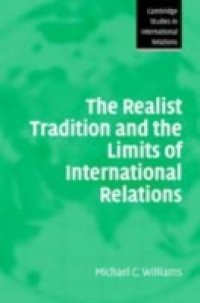Realism is commonly portrayed as theory that reduces international relations to pure power politics. Michael Williams provides an important reexamination of the Realist tradition and its relevance for contemporary international relations. Examining three thinkers commonly invoked as Realism's foremost proponents - Hobbes, Rousseau, and Morgenthau - the book shows that, far from advocating a crude realpolitik, Realism's most famous classical proponents actually stressed the need for a restrained exercise of power and a politics with ethics at its core. These ideas are more relevant than ever at a time when the nature of responsible responses to international problems are at the centre of contemporary political debate. This original interpretation of major thinkers will interest scholars of international relations and the history of ideas.


















